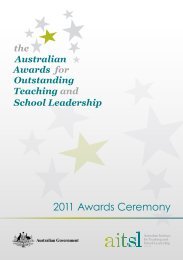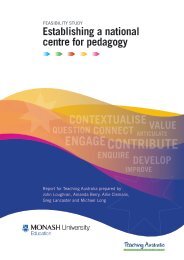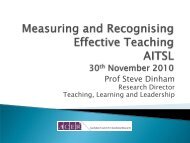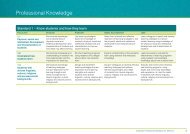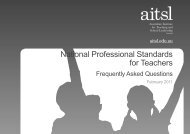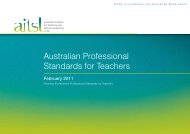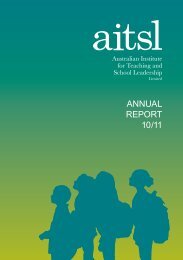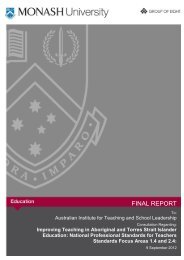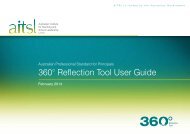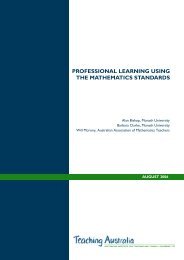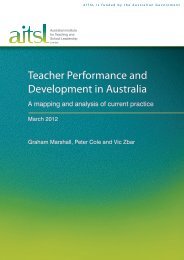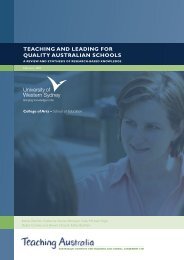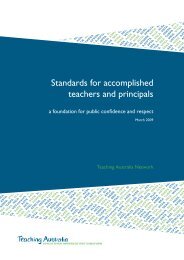p. 1051) conclude that, ‘Findings validate the need for alternative teacher professional development(TPD) models and the value of professional communities and knowledge acquired through technologyfacilitatedlearning’.Teacher preferences in professional learningWhile there is considerable research on the features of PL which have identifiable effects on teachers’knowledge, beliefs and practices, there is less evidence of teachers’ preferences for particular modesof PL.A UK survey was designed to capture a nationwide, representative sample of teachers, headteachersand schools to identify patterns of variation in the professional learning practices, values and beliefs ofteachers in English primary and secondary schools (Opfer, Pedder, and Lavicza 2008). Factor analysiswas used to identify underlying dimensions of teachers’ PL-related values and practices. The findingsidentified four factors related to organisational practices and patterns and school support:• A clear vision and formal systems of professional support and impact evaluation, which were highlyvalued. This included items referring to school leadership and staff commitment around a clearschool vision, as well as provision of PL opportunities and evaluation.• Performance management processes, which were valued by primary school teachers, schoolleaders, teachers in rural schools and advanced skills as well as novice teachers, but less so byothers. Performance management helped teachers link PL to professional standards and individualcareer goals.• Building social capital, which was the highest of all dimensions of school support, and referredto ‘fostering a learning culture in which teachers trust one another to take risks, plan together,and network as part of their CPD’ (Opfer et al. 2008). Items dealt with the occurrence of opencommunication where discussion, advice and collective decision-making about teaching occurred.• Supporting collaboration, networking and experimentation, though here values were only ‘fairlyhigh’, except for advanced skills teachers who recorded high values for this dimension.The survey by Opfer et al. (2008) also asked teachers about their values and practices for differentkinds of classroom-based professional learning activity, leading to the identification of three factors:• Experimental and adaptive learning, where ‘teachers learn by experimenting and adapting theirclassroom practices, reflection, self-evaluation, and responding to feedback from pupils andcolleagues’ (Opfer et al. 2008). The highest levels of values were recorded for this dimensionacross all sectors of schooling.• Research orientation had low levels of support from most teachers, but higher levels fromheadteachers, senior leaders and advanced skills teachers. This included reading researchreports, relating practice to research findings and modifying practice in the light of research.• Collaborative classroom-based learning and research, which was fairly highly valued, and includedjoint research/evaluation with colleagues, reflective discussions about practice, and collaborativeteaching and planning.The most comprehensive Australian evidence of teachers’ PL beliefs and preferences comes from a2008 study which surveyed 4574 teachers in 2000 schools across all States and Territories (Doecke etal. 2008). The survey found that:• The most preferred PL activities were those which provided ideas which could be incorporatedinto teaching (90%), included the latest trends in educational thinking (45%), challenged thinkingwith ‘big ideas’ (43%) and led to talking about work to other teachers (42%).• The reason for participation in PL was usually a personal choice from available options (55%),but often a decision by school administration (35%) or school administration influenced by externalpriorities (24%) or a school- based committee (22%).13 <strong>Professional</strong> <strong>Learning</strong> <strong>Flagship</strong> <strong>Program</strong>: <strong>Leading</strong> <strong>Curriculum</strong> <strong>Change</strong>: Literature Review
• In terms of location, most respondents did not mind whether the PL occurred in school or offsite(61%), but 31% preferred the latter.• On timing, when asked if they preferred that PL was held out of school hours, 52% said No, 6.5%said Yes, and 41% did not mind.• The most commonly experienced PL formats were workshop discussions with colleagues froma range of schools (68%), an outside speaker followed by discussion (68%), workshop discussionwithin the school (60%) and conference attendance (48.5%). 22% had participated in onlineinformation technology resources.• The most preferred PL formats were workshopping with colleagues (63%), listening to speakersexpert in teachers’ subject field (62%), listening to other teachers’ speak about their work andideas (52%), and visiting other schools or educational settings (45%). Use of online informationtechnology resources was preferred by 17% of respondents.• <strong>Change</strong> in practice as a result of PL was rated as significant by 23% of respondents, ‘a bit’ by63% and not really by 12.5%.• Credit for academic credentials was reported for all or most PL by 5% of respondents, but 78%reported that none of their PL was credited in this way.• Hindrances to PL participation were other work priorities (42%), cost (29%), distance issues(23.5%) and lack of available activities suited to needs (19%). For teachers in small towns,distance issues were mentioned by 72% and cost by 35%.Teachers’ preferences and evaluations of professional learning in many respects tend to support thefindings of research into the most effective professional learning: namely, that PL should be clearlylinked to practice and goals, should work through collaboration, and engage teachers in challengingthinking over sustained periods of time.<strong>Professional</strong> learning communitiesThe emphasis on collaboration and inquiry in research on teacher PL has led to a focus on professionallearning communities (PLCs), not only as the chief mode of implementation of PL, but also as a basis forsustaining successful educational practice within schools in general. The scope of the potential of PLCsis illustrated by Stoll et al. (2006 p. 221) in the conclusion of their wide-ranging literature review of PLCs:International evidence suggests that educational reform’s progress depends on teachers’ individualand collective capacity and its link with school-wide capacity for promoting pupils’ learning.Building capacity is therefore critical. Capacity is a complex blend of motivation, skill, positivelearning, organisational conditions and culture, and infrastructure of support. Put together, it givesindividuals, groups, whole school communities and school systems the power to get involved inand sustain learning over time. Developing professional learning communities (PLCs) appears tohold considerable promise for capacity building for sustainable improvement.Based to a large extent on the early work on learning organisations, notably Senge’s (1990) The FifthDiscipline, and the work of Lave and Wenger (1991) on communities of practice, PLCs are becomingthe most commonly used form of collaborative inquiry. The approach encapsulates the strengths of PLthrough a culture of inquiry identified in the literature by Colbert et al. (2008, p. 138):A culture of inquiry supports the use of data to evidence success, identify strengths andweaknesses, and measure progress toward goals. Cultures of inquiry can provide teacherswith opportunities to dialogue about learning as learning relates to lesson planning, studentachievement, and student work ... teachers have the opportunity to give and receive feedbackabout learning amongst their colleagues.A range of studies has shown the effectiveness of PLCs as an approach to PL, both in terms of teacherpractice and student learning (Cordingley, Bell, Thomasonand Firth 2005; Doecke et al. 2008; Fulton,Doerr, and Britton 2010; Giles and Hargreaves 2006; Goddard, Goddard and Tschannen-Moran<strong>Professional</strong> <strong>Learning</strong> <strong>Flagship</strong> <strong>Program</strong>: <strong>Leading</strong> <strong>Curriculum</strong> <strong>Change</strong>: Literature Review 14
- Page 1 and 2: Professional Learning FlagshipProgr
- Page 3 and 4: ContentsIntroduction ..............
- Page 5 and 6: Curriculum change: Implications for
- Page 7 and 8: Table 1: Overview of factors affect
- Page 9 and 10: This emphasis on capacity-building
- Page 11 and 12: Much of the foregoing discussion is
- Page 13 and 14: Features of successful professional
- Page 18 and 19: 2007; Gruenert 2005; Printy 2008; S
- Page 20 and 21: RecommendationsProfessional learnin
- Page 22 and 23: impersonal relationships• rationa
- Page 24 and 25: • The organisational goals are di
- Page 26 and 27: Table 2: Two views of teacher leade
- Page 28 and 29: A range of specifications and stand
- Page 30 and 31: In secondary schools, teacher leade
- Page 32 and 33: 1. Stimulus for innovation — Why
- Page 34 and 35: Table 4: Elements and processes of
- Page 36 and 37: The education of Indigenous student
- Page 38 and 39: ReferencesAinscow, M. (2005). Devel
- Page 40 and 41: Daly, A. J. (2009). Rigid Response
- Page 42 and 43: Hall, R. (1997). Knowledge Use and
- Page 44 and 45: Meirink, J., Meijer, P., Verloop, N
- Page 46 and 47: Thorpe, R., and Gold, J. (2010). Le
- Page 48: aitsl.edu.auFurther informationTele



